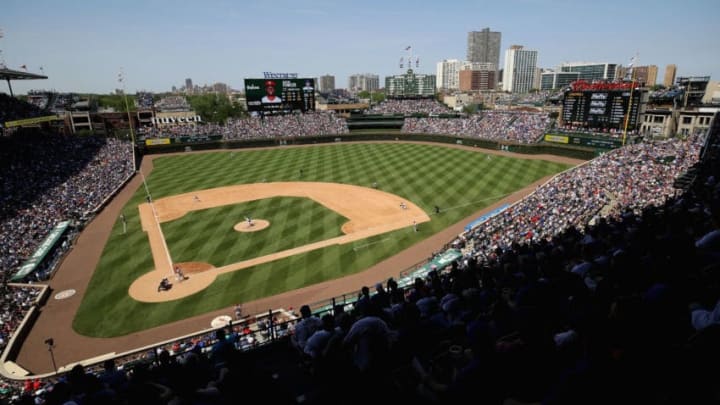The home of the Chicago Cubs is now officially a National Historic Landmark.
Well, the Chicago Cubs got what they wished for – seven years after the fact. On Thursday, we learned National Historic Landmark status was bestowed upon Wrigley Field, the 106-year-old sanctum. Fenway Park, home of the Boston Red Sox, earned the same designation more than a decade ago.
Still, a seven-year ‘hiatus’ wasn’t good for them. The Cubs deployed Crane Kenney, the President of Business Operations, to drum up some funds for them. I’ll give him credit: Kenney was steadfast in his ways.
For years, he’s pounded the drum at Cubs Convention, emphasizing the tax burden faced by ownership in the years following the completion of the 1060 Project, the revitalization and renovation of Wrigley Field and the surrounding area. Chairman Tom Ricketts had this to say in the aftermath of the Friendly Confines earning the honor.
More from Cubbies Crib
- Cubs should keep close eye on non-tender candidate Cody Bellinger
- Cubs starting pitching has been thriving on the North Side
- Make no mistake: the Cubs are very much about power hitters
- Cubs are giving pitcher Javier Assad a deserved shot
- Cubs: It’s time to start thinking about potential September call-ups
"“Wrigley Field is a special place in the hearts of generations of fans,” Chicago Cubs Executive Chairman Tom Ricketts said in a statement. “That’s why, from our first day as owners, we committed to preserving Wrigley, which will now take its well-earned place in the lineup of American history and culture as a national treasure.”"
The 1060 Project has included an wide mix of modernization and restoration measures, including the controversial video boards in left and right field, new and expanded luxury suites and clubs and renovated dugouts, clubhouses and aesthetic measures. That’s not to mention Gallagher Way, which is located outside the ballpark – and the surrounding developments the Ricketts also own.
This entire venture was bankrolled by ownership – without any assistance from the city of Chicago. This whole time, Ricketts had one thing on his mind: federal tax credits.
It’s a business, and it has to be run as such. I know Ricketts was a ‘big fan’ in his heyday; they all were. But Ricketts and his family purchased the team in 2009. In 2014, they broke ground on the ‘1060 Project’. Four years later, it drew to a close with Wrigley Field ushering in a new era.
Now, we know. COVID-19 put a kink in the financial picture for the team. No fans at the ballpark. No revenue streams for 81 home games. What if the league can’t pull off a full 162-game season in 2021? Can the league keep its head above water if there’s another campaign with no fans?
If nothing else, the Ricketts family will get relief in the form of this tax relief. That’s a big win for ownership heading into what looks like it’ll be an offseason dominated by cost-cutting measures.
